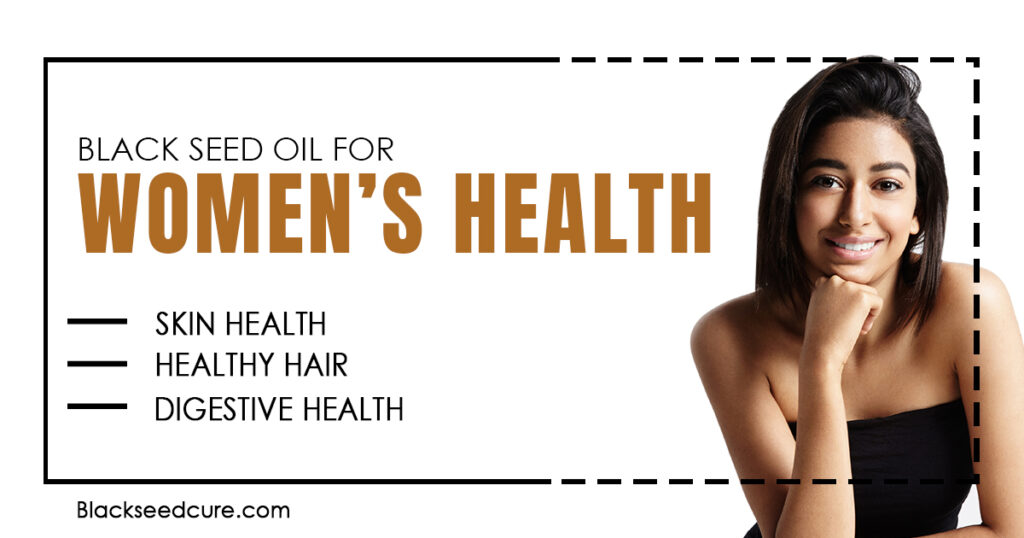SAME DAY DISPATCH & FREE USA SHIPPING
+ 10% Off for new customers
Black Seed Oil benefits for Women

Women’s health is a significant aspect of overall well-being, but it can come with its own set of challenges. Issues like hormonal imbalances, menstrual irregularities, and reproductive health concerns can be exhausting. However, there is a natural remedy that holds promise: black seed oil. Could this ancient oil offer relief and improve women’s health? Let us talk about the benefits of black seed oil for women and how black seed oil can help with specific health issues.
Black seed, also known as Nigella sativa, may support female fertility by promoting hormonal balance and enhancing reproductive health. It has a long history in traditional Islamic medicine as a way to promote lactation and improve fertility. It is high in omega-3 and omega-6 fatty acids and contains vitamins and minerals like A, C, calcium, and iron.
Adding to the above, These heavenly beneficial seeds can promote hair and skin health, stimulate the immune system, and provide antioxidant support. Keep joining me as I uncover the mysteries of black seed oil and how it might empower women on their road to full health.
Black Seed Oil Benefits for Women’s Health

Feminine Health
Hormonal Balance
Black seed oil has been shown to aid in regulating female hormones. It has phytoestrogens, which are plant compounds that mimic estrogen’s effects on the body. It can help with hot flashes, mood swings, and irregular periods. Hormonal imbalances can occur due to factors such as stress, diet, environmental toxins, or certain medical conditions.
Fertility and Pregnancy
Black seed oil has been shown to increase female fertility. It contains compounds that can aid in ovulation regulation and egg quality. Furthermore, studies have shown that black seed oil is beneficial during pregnancy. It has the potential to lower the risk of preterm labor and improve fetal growth.
Women’s Reproductive Health
Black seed oil may also have reproductive health benefits for women. It has traditionally been used to help regulate menstrual cycles and reduce PMS symptoms such as bloating and cramping. According to some studies, black seed oil may also have fertility benefits and help support a healthy pregnancy.
Breast Health
Black seed oil includes chemicals that may have antioxidant and anti-inflammatory qualities, which may protect against breast cancer. According to certain research, black seed oil may help lower the risk of breast cancer and limit the development of breast cancer cells.
Breastfeeding
Black seed oil has traditionally been used to help nursing mothers produce more milk. It contains compounds such as essential fatty acids, phytoestrogens, proteins, amino acids, and antioxidants that can aid in the stimulation of breast milk production.
Beauty Benefits
Skin Health
Black seed oil is a game changer when it comes to skin health. Its anti-inflammatory and moisturizing properties help reduce acne, relieve irritation, reduce the appearance of dark spots and fine lines, and promote a clear complexion. It is high in antioxidants and fights free radicals, leaving your skin revitalized and shining.
Healthy Hair
In the past, black seed oil was used to enhance hair texture and encourage healthy hair development. It contains substances that can support follicle strength and stop hair loss. Black seed oil can also help lessen dandruff and promote a healthier scalp.
Overall health
Cardiovascular Health
Black seed oil has been shown to help lower blood pressure and cholesterol levels, which may be beneficial to cardiovascular health. These effects may help reduce the risk of cardiovascular disease, stroke, and other conditions.
Digestive Health
Black seed oil has traditionally been used to support digestive health and may aid in the relief of indigestion, bloating, and gas symptoms. It may also be beneficial for people suffering from digestive disorders such as IBS and IBD.
Antioxidant activity and Anti-inflammatory properties
The anti-inflammatory properties of black seed oil may help reduce Inflammation, joint pain, and stiffness, making it a potential natural remedy for conditions like arthritis.
According to studies, the antioxidants in black seed oil can help shield cells from the oxidative damage that free radicals cause. This may contribute to overall health and well-being.
Immune system support and Respiratory health
Black seed oil is known for its potential immune-enhancing properties and for relieving respiratory problems. It helps strengthen the immune system and support its proper functioning. It also has respiratory health benefits, including relieving symptoms of asthma, allergies, and cough.
Note It down that scientific research on the specific effects of black seed oil on overall health is still ongoing, and individual results may vary.
Finally, in the above discussion about “Black seed oil benefits for women,” we have learned much about the potential benefits of black seed oil for women’s reproductive health, with its ability to promote hormonal balance, support fertility, and aid in pregnancy.
However, further scientific research is needed to fully understand its effects. Remember to consult with a healthcare professional for specific advice before incorporating black seed oil into your routine.
FAQS
How to use black seed for fertility?
To enhance reproductive health, take 1 teaspoon of black seed oil regularly or mix black seed powder into your meals or fluids.
Are there any side effects to using black seed oil?
In general, black seed oil is considered safe for most people. Some people, however, may develop allergic reactions or digestive problems such as an upset stomach or diarrhea.
Furthermore, Using black seed oil as a lubricant is not recommended as it may cause irritation or allergic reactions in sensitive areas.
Does black seed oil increase fertility?
Although black seed oil has generally been used to boost reproductive health, There is enough research supporting its significance in increasing fertility.
How to use black seed oil for female fertility?
To use black seed oil for female fertility, take 1 teaspoon of black seed oil daily or mix it with honey and warm water. For specific advice on fertility issues, it is best to speak with a healthcare expert.
Table of Contents
PRODUCT CATEGORIES
24/7 Customer Support
Why Black Seed Cure?
- Top Rated Brand
- USA Based Company
- Same Day Order Dispatching
- Free Shipping Orders Over $50
- Easy Return Policy
- Secure Online Payments
- World Best Black Seed Oils
- Complete Range
- 30 Days Money Back Gurantee
Contact Us
Black Seed Cure, 262 Butler Street, Brooklyn, New York 11217, United States
Helpline +1 (347) 771-9141
Disclaimer: Statements made, or products sold through this website, have not been evaluated by the United States Food and Drug Administration. They are not intended to diagnose, treat, cure or prevent any disease.
